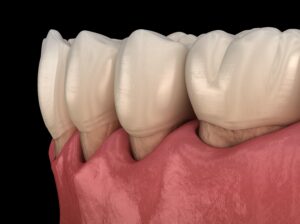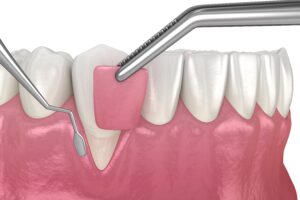Do Receding Gums Grow Back?

Gum recession is a common problem that affects many people. This blog post will discuss what gum recession is, how it’s caused and the various treatments available to help patients. We’ll also discuss whether receding gums grow back or not. We hope this article helps you better understand the condition of gum recession and find relief from your symptoms.
What is gum recession?

Gum recession is the gradual loss of gum tissue from around the teeth. This can cause the roots of your teeth to become exposed, which can lead to tooth sensitivity and even tooth loss in severe cases. As the gums pull away from the teeth, they can also form periodontal pockets. Periodontal pockets are gaps between the teeth and gums where plaque and bacteria accumulate. Unfortunately, these pockets can increase gum recession and make the problem worse.
Gum recession is common in adults and can be caused by a variety of factors, including:
- Poor oral hygiene habits
- Periodontal disease
- Injury to the gums
- Excessively aggressive tooth brushing or flossing
Gum Recession Treatments
Although there are plenty of things that can cause gum recession, receding gums won’t grow back since they don’t have a way to regenerate or repair themselves on their own. This is why it’s important to take care of your gums by practicing excellent oral hygiene and visiting the dentist regularly for cleanings. The good news is that there are treatments available that can help restore the lost gum tissue. These can include:
Periodontal Scaling and Root Planing
Scaling and root planing helps remove plaque, tartar and bacteria from the gum line. Once this has been accomplished, the root surfaces are smoothed out to prevent future plaque accumulation and reduce gum recession. Periodontal scaling and root planing is a common treatment used to treat gum recession caused by gum disease.

Lifestyle Changes
In addition to practicing good oral hygiene, there are a few other changes one can make to decrease gum recession. For example, being sure not to brush too hard or use a toothbrush that is too hard. Wearing a nightguard may also be helpful in the case that bruxism is causing gum recession.
Gum Grafts
Finally, severe cases of gum recession may require surgical intervention using a gum graft. This is a procedure where the gum tissue is removed from another part of the mouth and grafted around exposed tooth roots in need of coverage. The grafted tissue will eventually attach to your tooth’s root surface, which can prevent further recession over time. Gum grafts also prevent bone loss and decrease the risk of tooth decay.
If you’re experiencing any of the symptoms associated with gum recession, we encourage you to visit our office for a consultation. Our dentists will be able to help you determine the cause of your recession and recommend an appropriate treatment plan. The sooner you address gum recession, the better it is for your oral health.






Recent Comments